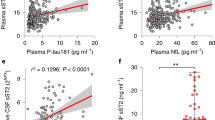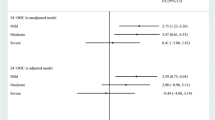Summary.
The peroxisome proliferator-activated receptor α (PPAR-α) is a member of the steroid hormone super family of ligand-inducible transcription factors, involved in glucose and lipid metabolism. We screened for polymorphisms in the PPAR-α gene and detected two known polymorphisms located in exon 5 and intron 7. These polymorphisms were investigated for their possible association with Alzheimer’s disease (AD) and for their effect in carriers of an insulin gene (INS) polymorphism. The PPAR-α C → G polymorphism in exon 5 (L162V) was associated with AD, in that the V-allele was more frequent in AD patients than in healthy subjects. Further data analysis revealed that carriers of an PPAR-α L162V V-allele and an INS-1 allele presented with an increased risk for AD. Cerebrospinal fluid amyloid-β levels were influenced by PPAR-α L162V genotype. These results suggest, that PPAR-α polymorphism may be a risk factor for AD.
Similar content being viewed by others
Author information
Authors and Affiliations
Additional information
Received December 30, 2002; accepted April 28, 2003 Published online June 30, 2003
Rights and permissions
About this article
Cite this article
Brune, S., Kölsch, H., Ptok, U. et al. Polymorphism in the peroxisome proliferator-activated receptor α gene influences the risk for Alzheimer’s disease. J Neural Transm 110, 1041–1050 (2003). https://doi.org/10.1007/s00702-003-0018-6
Issue Date:
DOI: https://doi.org/10.1007/s00702-003-0018-6




